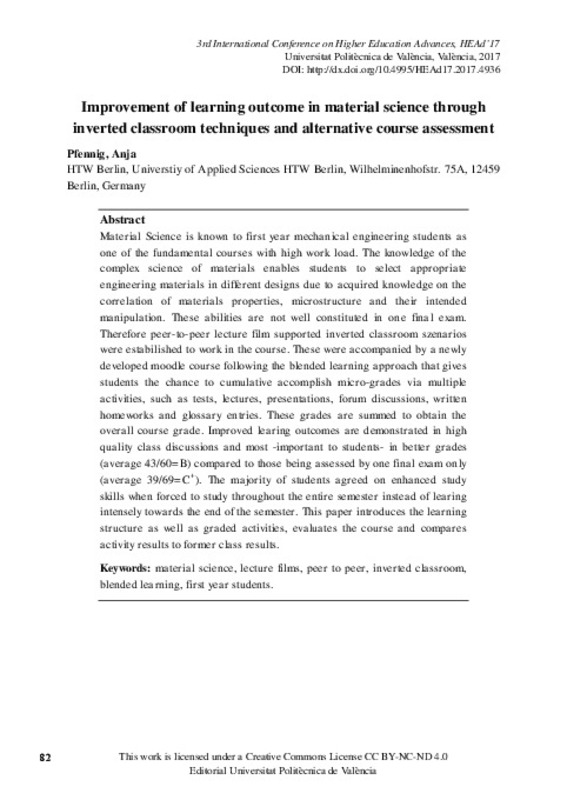JavaScript is disabled for your browser. Some features of this site may not work without it.
Buscar en RiuNet
Listar
Mi cuenta
Estadísticas
Ayuda RiuNet
Admin. UPV
Improvement of learning outcome in material science through inverted classroom techniques and alternative course assessment
Mostrar el registro sencillo del ítem
Ficheros en el ítem
| dc.contributor.author | Pfennig, Anja
|
es_ES |
| dc.date.accessioned | 2018-06-28T06:58:39Z | |
| dc.date.available | 2018-06-28T06:58:39Z | |
| dc.date.issued | 2017-06-26 | |
| dc.identifier.isbn | 9788490485903 | |
| dc.identifier.uri | http://hdl.handle.net/10251/104759 | |
| dc.description.abstract | [EN] Material Science is known to first year mechanical engineering students as one of the fundamental courses with high work load. The knowledge of the complex science of materials enables students to select appropriate engineering materials in different designs due to acquired knowledge on the correlation of materials properties, microstructure and their intended manipulation. These abilities are not well constituted in one final exam. Therefore peer-to-peer lecture film supported inverted classroom szenarios were estabilished to work in the course. These were accompanied by a newly developed moodle course following the blended learning approach that gives students the chance to cumulative accomplish micro-grades via multiple activities, such as tests, lectures, presentations, forum discussions, written homeworks and glossary entries. These grades are summed to obtain the overall course grade. Improved learing outcomes are demonstrated in high quality class discussions and most -important to students- in better grades (average 43/60=B) compared to those being assessed by one final exam only (average 39/69=C+). The majority of students agreed on enhanced study skills when forced to study throughout the entire semester instead of learing intensely towards the end of the semester. This paper introduces the learning structure as well as graded activities, evaluates the course and compares activity results to former class results. | es_ES |
| dc.format.extent | 9 | es_ES |
| dc.language | Inglés | es_ES |
| dc.publisher | Editorial Universitat Politècnica de València | es_ES |
| dc.relation.ispartof | Proceedings of the 3rd International Conference on Higher Education Advances | es_ES |
| dc.rights | Reconocimiento - No comercial - Sin obra derivada (by-nc-nd) | es_ES |
| dc.subject | Higher Education | es_ES |
| dc.subject | Learning | es_ES |
| dc.subject | Educational systems | es_ES |
| dc.subject | Teaching | es_ES |
| dc.subject | Material science | es_ES |
| dc.subject | Lecture films | es_ES |
| dc.subject | Peer to peer | es_ES |
| dc.subject | Inverted classroom | es_ES |
| dc.subject | Blended learning | es_ES |
| dc.subject | First year students | es_ES |
| dc.title | Improvement of learning outcome in material science through inverted classroom techniques and alternative course assessment | es_ES |
| dc.type | Capítulo de libro | es_ES |
| dc.type | Comunicación en congreso | es_ES |
| dc.identifier.doi | 10.4995/HEAD17.2017.4936 | |
| dc.rights.accessRights | Abierto | es_ES |
| dc.description.bibliographicCitation | Pfennig, A. (2017). Improvement of learning outcome in material science through inverted classroom techniques and alternative course assessment. En Proceedings of the 3rd International Conference on Higher Education Advances. Editorial Universitat Politècnica de València. 82-90. https://doi.org/10.4995/HEAD17.2017.4936 | es_ES |
| dc.description.accrualMethod | OCS | es_ES |
| dc.relation.conferencename | Third International Conference on Higher Education Advances | es_ES |
| dc.relation.conferencedate | June 21-23,2017 | es_ES |
| dc.relation.conferenceplace | Valencia, Spain | es_ES |
| dc.relation.publisherversion | http://ocs.editorial.upv.es/index.php/HEAD/HEAD17/paper/view/4936 | es_ES |
| dc.description.upvformatpinicio | 82 | es_ES |
| dc.description.upvformatpfin | 90 | es_ES |
| dc.type.version | info:eu-repo/semantics/publishedVersion | es_ES |
| dc.relation.pasarela | OCS\4936 | es_ES |








